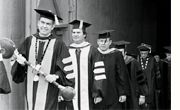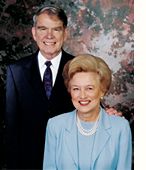 |
 |
||||||
|
|
 |
|
|
Hurley’s new duties involve building external relationships while overseeing each campus. In addition, he has begun to focus on regional, state and national issues that affect the UNT System. Describing his state-level duties, Hurley explains that legislative committees seem to want to deal directly with system chancellors as a group instead of working individually with presidents at every public university and health science center. The chancellor and his wife, Joanna, also are preparing for leading roles in an upcoming capital campaign.
Setting the course Wide-ranging respect for Hurley’s leadership at UNT, the partnerships he has forged throughout North Texas and the high regard he has earned from Texas legislators make it difficult for some to believe that presiding at UNT is his second career. Hurley enlisted in the U.S. Air Force in 1950 as a private. He aspired to become a pilot, but the Air Force judged him better suited for navigation and trained him accordingly. Hurley agreed. He admits, “After a ‘close call,’ my pilot training instructor said trying to teach me to fly had made him more religious.” Just the same, Hurley’s Air Force career lasted 30 years, ending with his promotion to brigadier general and retirement in 1980. He was a member of the U.S. Air Force Academy history faculty from the late ’50s to 1980. The skills Hurley honed in the Air Force — as navigator, planner, administrator and educator — served him well during the years he operated in the dual role of UNT president and chancellor. “Dr. Hurley not only got UNT off the ground, but he also set the course for it to soar,” says Bill Hunt (’60, ’64 M.B.A.), national chair of the upcoming UNT capital campaign and chair of the board of Internet America Inc., Digital Convergence.com Inc. and Intellicall Inc.
New directions Hurley joined UNT as vice president for administrative affairs on Sept. 1, 1980. Less than 17 months after his arrival, in February 1982, he became UNT’s 12th president and the second chancellor of the informal UNT System. Known as a modest man, Hurley always shares the credit for UNT’s progress during his presidency. He salutes farsighted regents; friendly Texas legislators and state officials; supportive community and business leaders; active alumni and friends; the talented faculty; a stable and dedicated administration and staff; and earnest and intelligent students. And he always acknowledges the role of his wife, Joanna. Conversely, members of every UNT constituency credit Hurley and his aptitude as a major factor in UNT’s rise to educational leadership in the North Texas region. In a September editorial, the Dallas Morning News spotlighted Hurley as “the unsung hero of higher education” and cited the “pivotal” role he has played for the North Texas region. “While other universities in this area have struggled at times to establish their roles, the University of North Texas has charged full speed ahead,” it states.
System guidance State Sen. Royce West developed a special admiration for Hurley when the two became major partners in the effort to bring a public university to the southern Dallas area, the future University of North Texas at Dallas. “Al Hurley
was the first educational administrator with whom I developed more
than a “Dr. Hurley and I believe the future of Texas is in the Dallas-Fort Worth Metroplex. We’ve worked together to establish a new public university infrastructure to address future needs,” West says. Hurley held
UNT’s top job longer than any other president in the school’s history.
Now at age 72, he is managing the UNT System, still setting ambitious
courses and looking forward, enthusiastically, to extending his
tenure as one of Texas’ longest-serving and most effective public
higher education chief executives.
|
||||||||
 After
nearly 19 years of helping the University of North Texas navigate
its way to increasingly impressive goals and destinations, Chancellor
Alfred F. Hurley is now chief executive officer of the UNT System.
As full-time chancellor, he is concentrating all of his efforts
on advancing the system and its three campuses.
After
nearly 19 years of helping the University of North Texas navigate
its way to increasingly impressive goals and destinations, Chancellor
Alfred F. Hurley is now chief executive officer of the UNT System.
As full-time chancellor, he is concentrating all of his efforts
on advancing the system and its three campuses.  political relationship. Now, I consider him a good friend,” he reveals.
political relationship. Now, I consider him a good friend,” he reveals.